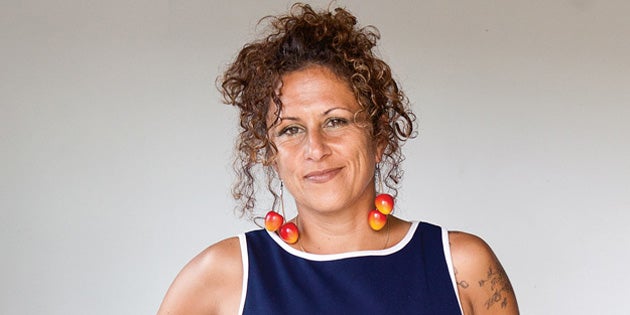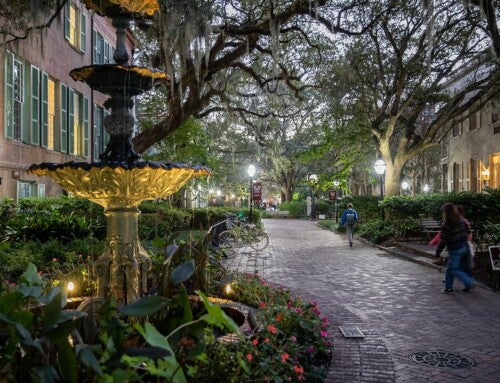When you’re attending a yoga and meditation retreat in beautiful Costa Rica, you probably can’t imagine life getting much better, or more peaceful. But when artist and activist Jackie Sumell ’96 of New Orleans finally retrieved her phone and obtained cell service during her trip to Central America, she learned some tremendous news: her friend Albert Woodfox would be released after spending 45 years in Louisiana prisons, nearly all of that time in solitary confinement. Criminal justice experts believe no other person in the United States has been held in solitary confinement for so long.
As a voicemail from Woodfox told her, in so many words: You better get your house ready, Jackie, because I’m coming home.
Woodfox is the last of the Angola Three inmates in Louisiana to be released from prison. These three inmates – Woodfox, Robert King and Herman Wallace – had become a cause célébre among criminal justice reform advocates and others because of their decades-long detention in solitary confinement within Louisiana State Penitentiary (which is also known as Angola, the name of a slave plantation that formerly occupied the prison site along the Mississippi River).
Woodfox was originally imprisoned at Angola in 1971 for armed robbery. A year later, a prison guard within Angola was killed. Woodfox and Wallace were soon convicted of the murder, though both proclaimed their innocence in trials that have subsequently been regarded as controversial or unfair, with crucial witnesses changing their stories. Woodfox and Wallace, both Black Panthers, were then placed in solitary confinement with fellow Black Panther Robert King.
Decades later, in 2005, Sumell moved to New Orleans following the destruction caused by Hurricane Katrina. She found the city in shambles, but decided to stay in the Big Easy, eventually learning about the Angola Three. Outraged that anyone could be placed in solitary confinement for so long, Sumell struck up a correspondence with Wallace, asking him to describe the house of his dreams. What followed was the international art exhibit The House that Herman Built, which contrasted the home of Wallace’s dreams with the reality of his 6-by-9-foot cell. PBS aired a documentary about it all, Herman’s House, and Sumell’s work was also featured in the 2010 film In the Land of the Free…, a documentary narrated by Samuel L. Jackson that examines the legal cases of the Angola Three. Among other awards, Sumell was named a 2013 Soros Justice Fellow for her work regarding prison reform.
Watch Sumell in the trailer for Herman’s House:
Robert King had been released in 2001 after serving 29 years in solitary confinement. In 2013, Sumell’s friend, Wallace, was released from prison when his 1970s murder conviction was overturned by a federal judge and he was ordered to receive a new trial. Wallace, who was suffering from terminal liver cancer by that point, left prison and died less than three days later. Despite the sadness she felt over her friend’s death, Sumell called his release “the most beautiful thing that has ever happened to me” and a validation of the hard work performed by her and other activists.
“You can never stop shy of a miracle,” said Sumell.
Read more about Sumell and “The House that Herman Built” in College of Charleston Magazine.
This time around, when Woodfox left prison on Feb. 19, 2016, –his 69th birthday – after prosecutors elected to not retry him for murder and he pleaded no contest to lesser charges (Woodfox has a long and complicated legal case related to the alleged murder), the celebration wasn’t as bittersweet. Slowly absorbing the many messages left on her phone in Costa Rica, Sumell felt a wave of positive emotions.
“Relief, joy, elation, pride,… the most unexpected was the calmness, the peace, the sense that this valve of struggle had just been released and unexpectedly returned my emotional being to a state of homeostasis,” said Sumell.

Sumell with the recently-released Albert Woodfox, one of the Angola Three inmates. Woodfox was released on his 69th birthday. In New Orleans it is tradition to pin money to a birthday celebrant’s chest.
She credits her friendship with the Angola Three for teaching her to be less selfish.
“Through meeting these remarkable men I learned that true happiness is secured by what you can do for others – through compassion and service,” says Sumell. “All three of these men embodied those principles in spite of the torture they endured for decades. From them I have learned an invaluable lesson that has secured sustainable happiness in my own life and I am humbly indebted. Today I feel nothing but euphoria.”
Even with the release of the last Angola Three inmate, Sumell says that she remains committed to prison reform. Indeed, her latest funded art project, Solitary Gardens, aims to abolish prisons – a goal she concedes may be difficult.
“I am a prison abolitionist,” Sumell says. “My goal in this lifetime is to see a landscape without prisons. It’s lofty I know, but so was ensuring that every member of the Angola Three be released… and that just happened. I think this society is married to ideas of the impossible as if that is the only reality. We are inured to punishment in ways we cannot recognize, our collective trauma points to punishment and retribution as the only solution for so-called crimes in our society. I believe that prisons are not the solution. Nor, in an advanced society, neither is punishment. Introducing conversations around prison abolition and securing the abolishment of solitary confinement is the next sharp target for me.”







